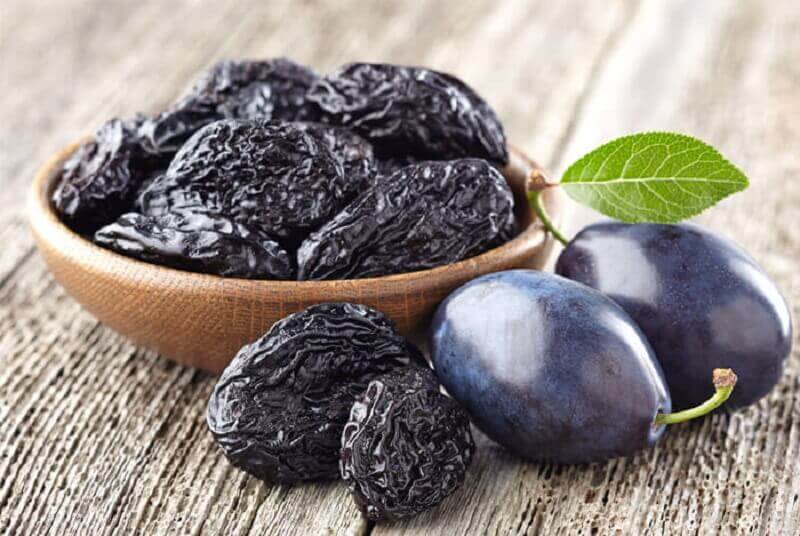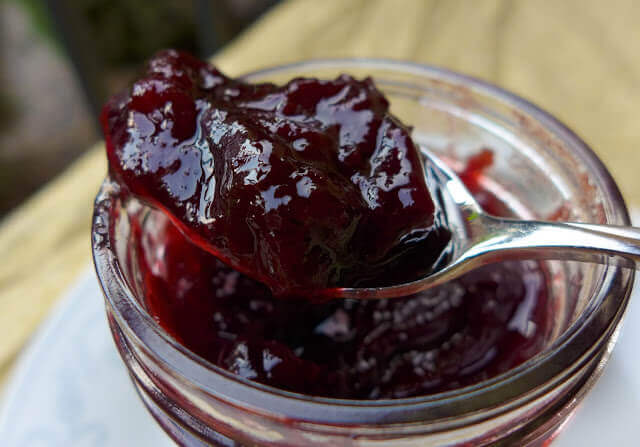How to Make a Homemade Syrup for Constipation

To find relief from constipation, it’s important to increase your water consumption in order to lubricate waste and encourage bowel movements. Consuming foods rich in fiber is key too.
Constipation is one of the most common digestive problems. It’s caused by changes in bowel habits that make it difficult to expel waste normally. It usually takes more effort and most of the time it’s three or more days before you feel the need to go to the bathroom.
As well as not being able to have a bowel movement, constipation triggers abdominal pain, gas and an overall uncomfortable feeling. In addition, due to the toxins that are retained in the colon, in many cases it causes complications that will need medical attention.
That’s why you’ll want to make some changes to stimulate bowel movements, especially when it’s still early. So we’d like to share a homemade syrup for constipation: it’s plum-based with lots of fiber.
Homemade prune syrup for constipation
Consuming homemade syrup is an alternative remedy for constipation. It helps get your intestines moving, thus making it easier to pass hard, dry stool.
It is made by mixing prunes with lemon juice, two ingredients that are rich in fiber and are also anti-inflammatory. Its laxative properties cleanse the colon by removing fecal waste without altering the pH of the bacterial flora.
Benefits of plums and prunes

- They contain high amounts of dietary fiber, a nutrient that helps give stools volume and make them easier to pass.
- This substance also decreases the accumulation of bad cholesterol (LDL).
- Although they’re low in calories, they contains natural sugars that your cells use as fuel.
- They’re a prebiotic food, meaning they serve as food for healthy bacteria.
- Also, plums are perfect for fighting inflammation and fluid retention thanks to the essential minerals they contain.
How do you make homemade syrup for constipation?

- Cheaper than many commercial laxatives.
- No harsh chemicals.
- No unwanted side effects.
- Can be taken several times a week.
- Provides extra energy and nutrients for the body.
For the reasons mentioned above, we will now share our detailed but simple recipe.
Ingredients
- 10 prunes
- The juice of one lemon
- ½ glass of water (100 ml)
Utensils
- Blender
- Glass jar with lid
Preparation
- Add the prunes to the blender and then add the juice of one lemon and half a glass of water.
- Process the ingredients for 2 or 3 minutes, making sure they are well-mixed.
- When the consistency is smooth and thick, store it in a glass jar with a lid and refrigerate it.
How to consume
- If you regularly suffer from constipation, consume 3 tablespoons of syrup before breakfast, 3 tablespoons at mid-morning and 2 tablespoons in the afternoon.
- If your condition is chronic, consume higher doses until normal bowel function is restored.
- To prevent constipation, take 2 or 3 tablespoons a day.
Important!

- Refined flour
- Sugar
- Cold cuts
- Fried foods and canned food
- High-sodium foods
In addition, try to increase your water consumption and your intake of fiber-rich foods, as both of these are helpful for proper functioning of your intestines. If you get constipated a lot, check with your doctor to see if it’s being caused by a something that will need extra attention.
All cited sources were thoroughly reviewed by our team to ensure their quality, reliability, currency, and validity. The bibliography of this article was considered reliable and of academic or scientific accuracy.
- Escudero Álvarez, E., & González Sánchez, P.. (2006). La fibra dietética. Nutrición Hospitalaria, 21(Supl. 2), 61-72. Recuperado en 10 de enero de 2019, de http://scielo.isciii.es/scielo.php?script=sci_arttext&pid=S0212-16112006000500007&lng=es&tlng=es.
- Sturtzel, B., & Elmadfa, I. (2008). Intervention with dietary fiber to treat constipation and reduce laxative use in residents of nursing homes. Annals of Nutrition and Metabolism. https://doi.org/10.1159/000115351
- Haniadka, R., Saldanha, E., Sunita, V., Palatty, P. L., Fayad, R., & Baliga, M. S. (2013). A review of the gastroprotective effects of ginger (Zingiber officinale Roscoe). Food and Function. https://doi.org/10.1039/c3fo30337c
- Rao, S. S. C. (2011). Biofeedback therapy for constipation in adults. Best Practice and Research: Clinical Gastroenterology. https://doi.org/10.1016/j.bpg.2011.01.004
This text is provided for informational purposes only and does not replace consultation with a professional. If in doubt, consult your specialist.








